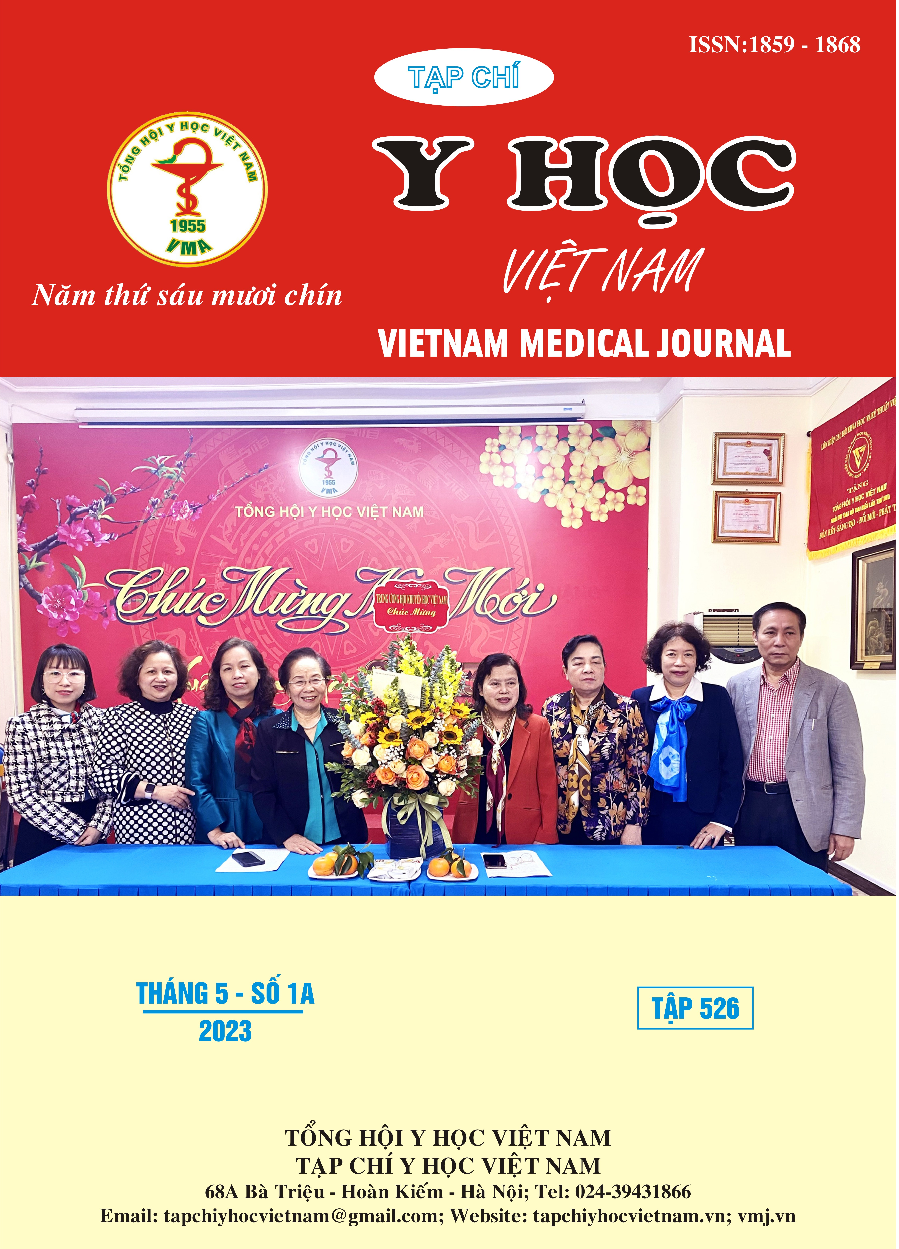SOME GENE VARIANTS RELATING TO THROMBOPHILIA IN RECURRENT PREGNANCY LOSS
Main Article Content
Abstract
Objectives: 1) Determining the alleles frequency that increase the risk of thrombosis in women with recurrent pregnancy loss (RPL). 2). The association between thrombophilic gene variants and the number of pregnancy loss. Subjects and methods: Retrospective study of 306 patients with unexplained RPL. These patients were tested 06 common gene variants by using The Devyser Thrombophilia kit (CE-IVD). Results: The percentage of patients with at least one variant was 93.46% (286/306). 79.41% patient had PAI-1 4G/5G that was the most common variant. MTHFR A1298C and MTHFR C677T were 47.72% and 31.04%, respectively. FVL, FVR2 are rare and FIIP mutation was undetectable. Among the individuals with variants, the patient with 2 variants was the highest (52.8% (151/286)), followed by the patient with one, three and four variants (37.1% (106/286), 9.4% (27/286) and 0.7% (2/286), respectively). The frequency of mutations was no statistically significant difference between two pregnancy loss group and more than two RPL group. The combination of two common variants PAI-1 4G/MTHFR A1298C and PAI-1 4G/MTHFR C677T did not increase the number of RPL compared with cases carrying only one gene variant. Conclusion. The rate of 6 gene mutations that increase the risk of thrombosis in women with a history of RPL is 93.46%. The ratio of common abnormal genotypes was not statistically significant in the group of patients with RPL 2 times and 3 times or more. The combination of 2 common gene mutations PAI-1 4G/MTHFR A1298C and PAI-1 4G/MTHFR C677T was not associated with the degree of pregnancy loss compared with single gene abnormality.
Article Details
Keywords
Recurrent pregnancy loss (RPL), PAI-1 4G/5G, MTHFR A1298C, MTHFR C677T, FVL G1691A, FVR2 A4070G, FIIP G20210A
References
2. Mutiso, S.K., A. Murage, and A.M. Mukaindo, Prevalence of positive depression screen among post miscarriage women- A cross sectional study. BMC Psychiatry, 2018. 18(1): p. 32.
3. Sarto A, Rocha M, Martinez M, Sergio RP (2000) Hypofbrinolysis and other hemostatic defects in women with antecedents of early reproductive failure. Medicina. 60(4):441–447.
4. Li X, Liu Y, Zhang R, Tan J, Chen L, Liu Y (2015). Me-ta-analysis of the association between plasminogen activator inhibitor-1 4G/5G polymorphism and recurrent pregnancy loss. Med Sci Monit. 21:1051- 6.
5. Amela Jusić, Devleta Balić, Aldijana Avdić, et al. (2018). The association of factor V G1961A (factor V Leiden), prothrombin G20210A, MTHFR C677T and PAI-1 4G/5G polymorphisms with recurrent pregnancy loss in Bosnian women. Med Glas (Zenica) 2018; 15(2):158-163.
6. Farahmand, K., M. Totonchi, M. Hashemi, et al., Thrombophilic genes alterations as risk factor for recurrent pregnancy loss. J Matern Fetal Neonatal Med, 2016. 29(8): p. 1269-73.
7. Trịnh Thị Quế, Đoàn Thị Kim Phượng, Tạ Thành Văn, và cộng sự, Phân tích biến thể C677T và A1298C của gen MTHFR ở phụ nữ có tiền sử sẩy thai, thai chết lưu. Tạp Chí Phụ sản, 16(3), 42-45., 2019.
8. Ahangari, N., M. Doosti, N. Mousavifar, et al., Hereditary thrombophilia genetic variants in recurrent pregnancy loss. Arch Gynecol Obstet, 2019. 300(3): p. 777-782.
9. Mtiraoui, N., W. Zammiti, L. Ghazouani, et al., Methylenetetrahydrofolate reductase C677T and A1298C polymorphism and changes in homocysteine concentrations in women with idiopathic recurrent pregnancy losses. Reproduction, 2006. 131(2): p. 395-401.
10. Bigdeli, R., M.R. Younesi, E. Panahnejad, et al., Association between thrombophilia gene polymorphisms and recurrent pregnancy loss risk in the Iranian population. Syst Biol Reprod Med, 2018. 64(4): p. 274-282.


